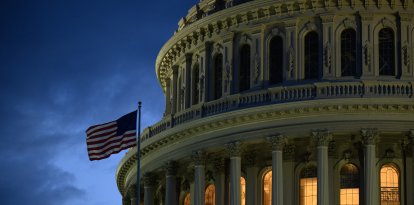Democrat-linked activist group has thousands of doctors recruiting psychiatric patients to vote
From patients in emergency rooms and palliative care, they would be being used for political purposes.

Voting
A report reveals that health centers are registering their patients to vote in the upcoming presidential election. The practice has spread from psychiatric hospitals to neonatal intensive care units, generating controversy, especially in key states for the upcoming elections.
The Washington Free Beacon revealed that the Pennsylvania Psychiatric Institute, an 89-bed facility affiliated with Pennsylvania State University, implemented a voter registration program for its inpatients. This program includes patients with serious diagnoses such as schizophrenia, substance abuse, depression or bipolar disorder. Although many of these patients have difficulty carrying out their daily activities and their stay in the hospital is often involuntary, the facility provides them with the option to participate in the electoral process.
The hospital argues that voting is a "therapeutic tool" that helps empower patients and improve their mental well-being. "Voting is an important part of the recovery process," said Julie Graziane, a geriatric psychiatrist in charge of the hospital's citizen participation efforts. However, this practice has generated criticism and ethical concerns.
Opponents of such practices argue that registering patients to vote in medical settings compromises the integrity of the physician-patient relationship and introduces a potential for coercion. "It’s such a contamination of a physician’s role," said Sally Satel, a professor of psychiatry at Yale School of Medicine. Critics fear that the power dynamic between physician and patient could be exploited for political purposes, especially in vulnerable populations such as psychiatric patients and parents of newborns in the NICU.
Jane Rosenthal, a medical ethicist at New York University's Tisch Hospital, also questions the ability of inpatient psychiatric patients to give informed consent. "Oftentimes these patients do not have the capacity to make a decision early on in an acute hospitalization," she said. Compounding these concerns is the lack of restrictions in Pennsylvania's election laws, which do not impose competency requirements on voters in psychiatric hospitals.
The organization behind the movement.
Vot-ER, a nonprofit organization founded by Alister Martin, a Harvard Medical School emergency physician and former advisor to Vice President Kamala Harris, has been a key player in this initiative.
Vot-ER is involved in a broader campaign affecting various types of health care facilities. These include cancer hospitals, emergency rooms, substance abuse clinics, palliative care departments and neonatal intensive care units. The organization has worked with more than 700 health care facilities in total, and its voter registration program has been extended to several medical institutions across the country.
Vot-ER has helped more than 50,000 physicians register their patients to vote, using tools such as QR-code badges that facilitate online registration.
Although Vot-ER bills itself as a nonpartisan organization, its ties to Democratic figures and foundations have raised suspicions. The organization collaborates with A Healthier Democracy, which promotes the progressive Diversity, Equity and Inclusion (DEI) agenda as pillars of fair health care. In addition, it has advised the Biden-Harris Administration on the implementation of a 2021 executive order instructing all federal agencies to promote voting access. These factors, along with association with progressive foundations and involvement in voting access policies aligned with a specific political agenda, have raised questions about Vot-ER's impartiality and influence in the political sphere.
Critics claim that Vot-ER is transforming physicians into political activists and using patients as political tools. "The claim that voter registration is a form of psychiatric treatment in a general sense is absurd. It’s misappropriating mental health terminology to further a blatantly political agenda," said Elliot Kaminetzky, a New York psychologist specializing in anxiety disorders.

























